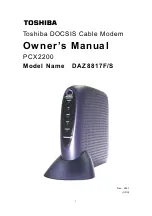
User’s Guide
3
1. Before You Begin
Your new cable modem provides high-speed access to the Internet by an active Internet Connection
through your cable service provider. This user guide describes how to set up and use the cable
modem. Before installing the cable modem, you should read this user guide to ensure proper cable
modem operation.
Understand the Cable Modem’s Features
Your cable modem has the following features to help you access and use the Internet:
•
Two-way design allows the cable modem to send and receive data over the cable television
network.
•
Cable bandwidth allows data rates of up to 38 megabits per second (Mbps)*, which is faster
than analog modems, integrated services digital network (ISDN), or asymmetric digital
subscriber line (ADSL).
•
Using your cable line means that the cable modem is always on, always connected, and does
not tie up your phone line.
•
Plug-and-play operation through universal serial bus (USB) ensures easy setup and
installation.
•
Data Over Cable Service Interface Specification (DOCSIS
) compliance ensures
interoperability with DOCSIS compliant cable operators.
•
Windows Hardware Quality Labs (WHQL) certification ensures interoperability with
Microsoft Operating Systems.
*NOTE: Speeds may vary based on the following factors:
•
Computer equipment including available RAM and processor speed
•
Software applications utilizing your computer’s resources
•
Network traffic depending on the time of day
•
Limitations set by your Cable Service Provider
Contact Your Local Cable Operator
Before installing you new cable modem, you must contact your local cable service provider to
activate your Internet account. Be sure to have the cable modem’s MAC address available, which
can be found on the underside of the cable modem.




































